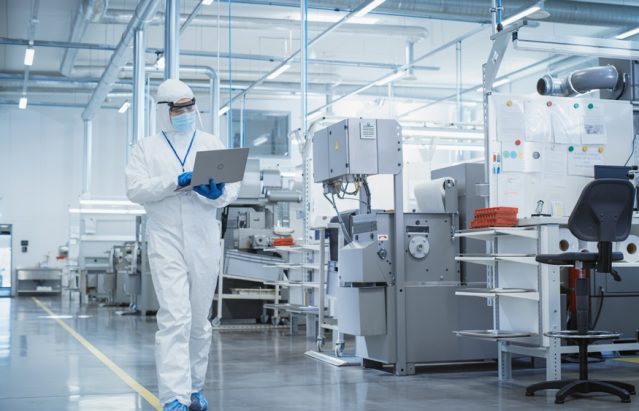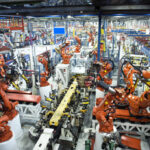Imagine a world where life-saving medicines take a long time to develop and slow down the treatment of chronic diseases. Even a small error can put lives at risk. Now imagine the opposite world, where medicines are reaching patients faster, accurately, and safely, or saving most lives. This is the power of automation in a pharmaceutical company.
Because of the rising demand for pharma products, companies no longer depend on traditional methods. When automation in the pharmaceutical industry boosts efficiency and reduces costs to meet the highest quality medicine standards.
In this article, we will explore automation in the pharmaceutical industry: standards & technology.
Demand For Automation In The Pharmaceutical Industry
The global demand for the pharmaceutical industry is continuously growing. All pharmasuitcial. Companies have become smarter, safer, and faster ways to produce medicine. In 2023, the automation market was valued at around USD 6.11 billion, and it approximately USD 12.24 billion by 2032 is growing at a CAGR of 8.02%.
What Is The Growing Role Of Automation In Pharma?
Pharmaceutical companies are rapidly growing and adopting automation technology to reduce challenges such as human error, supply chain inefficiencies, and rigid quality controls. The automation industry helps the pharmaceutical industry in repetitive tasks like formation, testing, and documentation.
It ensures higher productivity and effectiveness in the pharmaceutical industry. Furthermore, automation records every data and mainly focuses on higher critical condition decision making or instead of routine manual work.
Faster drug development and complex regulatory requirements of formulation testing, quality checks, and documentation, ensuring consistent outcomes.
Or the automation helps to allow highly skilled professionals to focus on researching and developing the research instead of manual tasks.
What Are The Key Benefits Of Automation In The Pharma Industry?

In the pharmaceutical industry, automation improves product quality and minimizes errors to meet global standards or reduce manual operational costs. Automation system in the pharmaceutical industry supports predictive maintenance by analysing and detecting real-time monitoring. Moreover, it helps to enhance workplace safety by analysing human exposure to hazardous chemicals or sensitive drugs. It provides alerts to higher authorities to detect any serious or sensitive conditions.
Enhanced accuracy and precision
The automation industry reduces human errors in the production units in drug formation and labeling. By using automation in the pharmaceutical industry, every product meets strict quality standards.
Fast production and higher efficiency
With the help of robotics and automation, machines work accurately in the pharmaceutical industry. This advanced technique takes proper care of repetitive tasks, mixing and testing. This process saves a lot of time and effort in the pharma industry.
Data monitoring and compliance made easier
The automation in the pharmaceutical industry involves proper data recording, traceability, and real-time data monitoring. It helps companies stay aligned with global standards like FDA, GMP, and ISO.
Increase workers’ safety or patient conditions.
It reduces the risk of hazardous processes like toxic chemicals and harsh environments. The automation manages and stabilizes the risk of medicines’ safety for patients.
Cost Savings Over Time
Automation reduces the cut wastage, labour costs, and gives natural results in long-term profitability.
Data records and make decisions better
Automation controls all production and manufacturing units’ data and maintains proper records of all medicines that are safe and effective for worldwide use.
What Are The Standard Automation Guidelines In The Pharma Industry?
Automation in the pharmaceutical industry maintains safe, efficient, and compliance have strict guidelines in international safety standards.
- Good manufacturing price (GMP): it analyzes and detects that all the pharmaceutical products are manufactured and controlled according to quality standards. Because automation supports controlling risks and enhancing medicine quality.
- ISO standards: according to ISO 13485, a quality management system for the pharmaceutical industry and equipment. And ISO 9001 ensures that the product quality and efficiency are maintained. IEC 17025 standards for testing in laboratories.
- FDA 21 CFR part 11:
According to U.S regulations, electronic item safety records and signatures must be handled. Automation system ensures safety data to track and audit trials. - EU Annex 11: According to European guidelines pharmaceutical manufacturing industry uses computerized systems to analyze secure and traceable data for data integrity.
What Are The Cutting-Edge Automation Technologies In The Pharmaceutical Industry?
- It reduces operational risks while improving production quality and speed.
- AI and machine learning enhance data recovery and minimize critical trial decisions.
- Automated guided vehicles safely transport raw materials and finished products in manufacturing plants
- The automation technology monitors all manufacturing data, ensuring the product quality, and reduces manual checkups.
- IIOT, the smart devices and sensors monitor real-time data like temperature, humidity, and environment.
- Automation technology manages data recording and maintains data documentation in pharmaceutical labs.
What Are The Real-World Applications Of Automation In Pharma?
The automation industry helps to grow in the pharmaceutical industry, because it handles data and makes processes faster and more reliable.
- Drug discovery
- Clinical trials
- Manufacturing & packaging
- Quality control
- Supply chain management
Why Choose Unseen Era For Automation In The Pharmaceutical Industry: Standards & Technologies?
Unseen Era stood in the automation industry in 2010. We provide excellent automation sensors, vision lights, and camera lenses. Food and beverage, manufacturing, automotive, and chemical industries trust the unseen era. Our solutions are tailored to customer needs with ensuring precision, reliability, and seamless.
What we offer:
- Energy management system
- Product management system
- Predictive maintenance system
- Downtime monitoring
Faq’s About Automation In The Pharmaceutical Industry: Standards & Technologies
Q.1 What are the types of automation key technologies used in the pharmaceutical industry?
A: The key technologies include robotics, artificial intelligence, and AI machine learning.
- PAT
- IoT
- LIMS
- AI
Q.2 What are the challenges of adapting an automation system people facing in the pharmaceutical industry?
A: The pharmaceutical industry faces various problems, like high investment, staff training, and spending money to maintain cybersecurity for sensitive data.
Q.3 Does automation technology replace human error in the pharmaceutical industry?
A: Automation in the pharma industry reduces manual inspections, robotics sensors analyse digital monitoring, and AI ensures accuracy. It eliminates the most common human errors.
Q.4 How does automation technology customize medicines in the pharmaceutical industry?
A: Automation technology allows 3D printing of drugs, and AI-driven data to produce faster, with higher accuracy and compliance.










 Call
Call Whatsapp
Whatsapp Contact Us
Contact Us